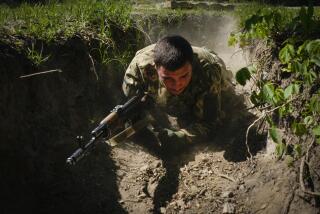Soviets Offer Lithuanian Army Deserters Amnesty
- Share via
MOSCOW — The Kremlin offered conditional amnesty to Lithuanian deserters today after the breakaway republic backed down on creating its own border force, but President Mihail S. Gorbachev faced new challenges in Estonia and the Ukraine.
The amnesty offer was reported by the official Tass news agency, which said any Lithuanian deserter who gives up and promises to continue his military service will not be prosecuted.
“It is stressed, however, that people who continue to break the law of the U.S.S.R. on general military service will be sought out, detained and face criminal punishments in accordance with the relevant legislation,” it added.
Tass quoted Lt. Gen. Franz Markovsky of the armed forces general staff as saying more than 250 men have deserted in Lithuania since the breakaway republic’s officials proclaimed that Lithuanians were no longer liable for Soviet military service.
Fifty-one have been sent back to their units, the report said, but it was not clear whether they were included in the total figure.
Soviet men are required to serve two years in the army or three in the navy, and penalties for refusing range from three to seven years in jail. Before Lithuania declared its independence March 11, many recruits from the republic were complaining of abuse from Russian officers.
Soviet forces arrested 23 deserters in dawn raids Tuesday, and the Lithuanian health minister said some were beaten. Merys Laurinkus, head of a Lithuanian Parliament commission, said Soviet authorities have promised not to punish them.
The Lithuanian government has demanded the arrested men’s return, saying they were “kidnaped.” Lithuania also protested to Gorbachev over the occupation by armed soldiers of several public buildings in the capital, Vilnius.
Lithuania also appealed to U.S. senators and congressmen to pressure the Bush Administration for recognition, saying this would not only aid democracy in Eastern Europe but prevent Gorbachev from making a “gross mistake.”
The message, which said Lithuania’s freedom is in “great danger,” was signed by Lithuanian President Vytautas Landsbergis, who on Wednesday backed down on an earlier proposal to create an independent border force in the republic.
The Estonian Parliament, controlled by pro-independence groups, was expected to vote later in the day to suspend the Soviet constitution in the northernmost Baltic republic, a top Communist Party official in the capital of Tallinn said.
Hundreds of demonstrators in Tallinn also called on their deputies to support Lithuania’s independence and freedom for Estonia, which along with the third Baltic republic of Latvia was annexed in 1940 under a Nazi-Soviet pact.
In the western Ukraine, meanwhile, 24 deputies from a radical opposition alliance seeking sovereignty for their republic called on the Ukrainian Parliament to recognize Lithuanian independence when it meets later this spring.
More to Read
Sign up for Essential California
The most important California stories and recommendations in your inbox every morning.
You may occasionally receive promotional content from the Los Angeles Times.













